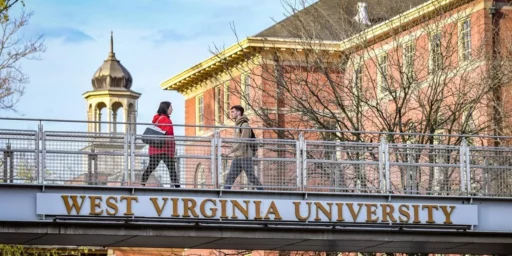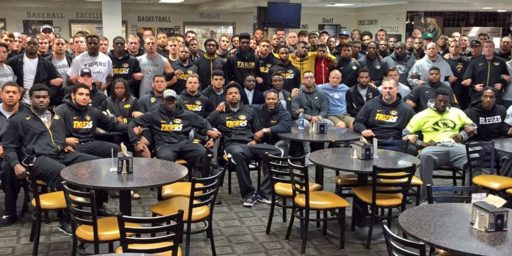College Football vs. Academics
Via Margaret Soltan, I see that UT San Antonio is starting up a football team and that the faculty are predictably concerned about the potential drain on resources.
Next fall, UTSA will spend millions to field a football team it hopes will someday compete with cross-state rivals like the University of Texas, Texas Tech and Texas A&M. But the plan goes far beyond athletics. As the college makes a push to become one of the next tier-one research universities in Texas, campus leaders say the school’s academic and athletic goals are closely linked.
Students and administrators, led by UTSA President Ricardo Romo, hope the team will foster school pride and capture the attention of alumni, who they believe will be more likely to support university financially. They also hope a team will transform the university from a commuter school to one where students live and play. “The whole campus is kind of buzzing about it,” says Travis Goodrich, a UTSA sophomore. “We need school spirit. We don’t really have that right now.”
But there are skeptics. While many faculty have enthusiastically supported the creation of the football program, others have wondered whether the university has its priorities straight. Mansour El-Kikhia, president of UTSA’s faculty senate, says faculty support is mixed for the project. The major fear, he says, is that the team will distract from the university’s academic mission or divert dollars from the institutional budget. The university has pledged “that no funds will be taken away from the institution to finance this football team,” El-Kikhia says. “Of course, there’s always the fear that UTSA will become a diploma mill for athletes and so forth.”
[…]
Steven Kellman, a professor of English at UTSA, said he would rather have had the school’s most generous alumni contribute to academics, not a football team. He worries that if the team isn’t profitable quickly, the school will be footing the bill. A 2009 NCAA study found that only 18 athletic programs reported positive revenue for all five years surveyed. “I can’t imagine that a new program just getting off the ground would have positive revenue, even with outside donations,” Kellman says. “UTSA is a young institution that cannot count on a large corps of alumni, particularly wealthy alumni.”
Romo says the boosters who donate to football are not necessarily the same people who would donate to academic programs. But Dennis Coates, an economist at the University of Maryland and a contributor to the Sports Economicst blog, says the concern that football is siphoning off potential donations for academic purposes is a frequent source of conflict at schools with teams. And he says that even many of the most successful programs struggle to turn a profit. “In many institutions the athletic departments get subsidized by the rest of the university — not the other way around, as the idea of football as a profit center for the university suggests,” he says.
The last point is clever obfuscation: Football is certainly profitable at many, many schools. But that money’s typically funneled back into the overall athletic program where it has to fund a myriad of money-losing programs. Like, for example, all the women’s teams except perhaps basketball at two or three schools.
Otherwise, though, I’m sympathetic to the faculty position, having been at Troy State (now Troy) when it was making the move from Division I-AA to Division I-A. On paper, it was the dumbest possible idea. Alabama has 4.3 million people and already had two entrenched football powerhouses in Alabama and Auburn and a third school, UAB, making the move. And Troy had 5000ish students on campus and 20,000ish people in all of Pike County, yet I-A required guaranteeing something like 25,000 paid attendees at every home game.
And, yet, it seems by all accounts to have been a good move. The school’s profile has undeniably been raised, which makes it more likely that alumni will donate money for buildings, academic programs, and the like.
Like it or not — and I generally don’t — college sports is the main thing that makes alumni enthusiastic about their school.






That was definitely the case at my university. The football program was and is by and far both the most popular program as well as the biggest money spinner.
Seems to me it would be easy enough for universities to spin off the football programs, so that they completely subsist on ticket sales, broadcast rights, and booster contributions. Then there would be no Title IX implications, since the contribution the school would have to match would be zero.
Under such strictures, I’d bet that no more than a couple dozen college football programs would be profitable, mainly powerhouses like Oklahoma, Texas, LSU, Ohio State, USC. The economics favor consolidation among those top-tier programs. College football startups like the one contemplated at UTSA are unlikely to be self-sustaining for many years, if ever (even if alumni contributions to the school itself are factored in).
I think the profitability of college football is exaggerated (and perhaps dated). It’s probably closer to half of the division IA teams run a profit, and half don’t. There are probably about 25 teams that make a lot of money and that divide is increasing.
When the NCAA does it’s profitability analysis, it includes as revenue to the athletic program, student fees, budget grants and services from the college, and government support. At least two of these three things take money away from the accademic programs. (Would the government support be redirected towards academic programs w/o sports? Depends, some of the rationale for government subsidies have to do with the benefits sporting events have on local commerce: beer hats and foam fingers)
More importantly, NCAA figures don’t include a deduction for capital expenditures. So, debt service payments or depreciation charges on these multimillion-dollar, skybox-littered stadiums are not accounted for.
LINK
Troy was a special case because they had a very good football prgram already in place and just moved up a level of competition. Starting from scratch as UTSA is doing is a whole ‘nother story.
A better example from Alabama might have been the UAB program.
I’d add that IIRC, when UAB started up its football program Auburn went out and signed them up to a ten year deal. I didn’t see a similar rush to sign up Troy.
Faculty will always be against sports because they are part of the liberal Professoriate.
They look to Amy Bishop as a hero since she is an Anti-American nut.
They hate American things like Football, which is why they show so much disdain for American heroes like Brett Favre and Tim Tebow.
I think sports programs in college are a good thing in general, although I think at a lot of schools men’s football and/or basketball keep all the other sports in competition-not just women’s, but some of the less popular men’s sports.
At my university football was the only sport that filled the stadium-basketball sold some tickets, but I don’t think I ever saw the stadium at full capacity.
Even better for a school though, is when a strong rivalry develops between one school and another-especially something like the Auburn and Alabama one, because the fans are close enough to travel.
Clearly the problem is this artificial and unnecessary schism between football player and academic students.
I have a simple solution: use regular students — chosen at random — as players. Then alumni who contribute would be contributing to both academics and sports simultaneously.
And profit margins would be greatly improved if rather than spending 6 figures or even 7 figures for some so-called “football coach” a rotating roster of tenured professors took on the job.
Imagine the revolutionary effect on the sport if, say, the chair of the philosophy department coached a team of randomly-chosen pre-med, pre-law, french literature, accounting, sociology and psychology students.
LOL Reynolds and me in complete agreement. Who knew??
“I have a simple solution: use regular students — chosen at random — as players. Then alumni who contribute would be contributing to both academics and sports simultaneously.”
You go, dude.
“And profit margins would be greatly improved if rather than spending 6 figures or even 7 figures for some so-called “football coach” a rotating roster of tenured professors took on the job.”
I suspect your margin assumptions are completely full of shit. But who cares?? Are we running a university, or a football minor league? Wait……
“Imagine the revolutionary effect on the sport if, say, the chair of the philosophy department coached a team of randomly-chosen pre-med, pre-law, french literature, accounting, sociology and psychology students.”
Its called 1920. IVY League…Beaver coats an such………….
Ya know, Michael, I should buy you a drink some time……..I might even like you….
Drew:
I blame the IRS. I had to pay my corporate taxes today. By my calculations I contrived to pay more than I actually made.
Somehow the experience pushed me to the right — closer to you. Yep, feeling positively libertarianish. You might have to buy me that drink, I may not be able to afford more than small beer.
James,
I know this is irrelephant, but you given me the perfect opportunity to quote Groucho Marx on what a university should do when a university must choose between academics and sports
Professor Wagstaff: Tomorrow we start tearing down the college.
The Professors: But, Professor, where will the students sleep?
Professor Wagstaff: Where they always sleep: in the classroom.
Cheers,
Bill
“I had to pay my corporate taxes today. By my calculations I contrived to pay more than I actually made.”
That can only be due to the concept called “phantom income.” Something we try to avoid like the plague.
Lost in all the arguments about progressive tax rates or flat tax rates is the complexity of the many decisions about just what is income. Though what this has to do with collegiate football escapes me just now.